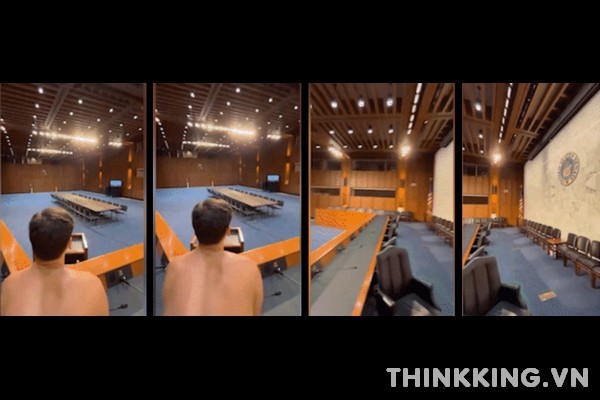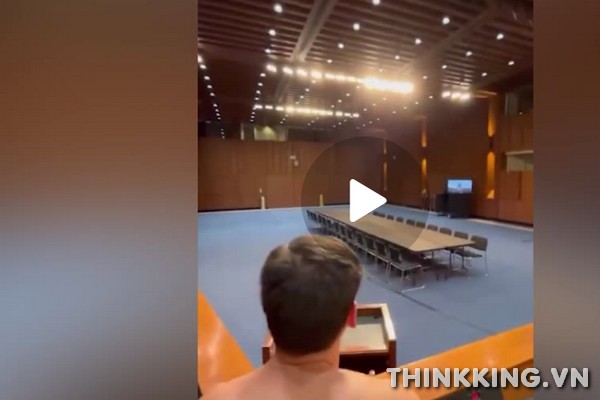The Senate Scandal Unveiled: A Staffer’s Intimate Misconduct Goes Viral
In a bewildering breach of decorum, the hallowed chambers of the US Senate have become the backdrop for a scandal that’s erupted into the public eye through platforms like Twitter, Reddit, and Instagram. “Senate Staffer Video Twitter Reddit Instagram “, A video, so intimate in nature, featuring a Senate staffer—allegedly Aidan Maese-Czeropski—has sparked a national conversation on the professional conduct within political spheres. This is the unraveling of a narrative that intertwines personal indiscretion with the sanctity of public service. Follow Thinkking.vn for more.
The Spark of Scandal: A Senate Staffer’s Indiscretion

In the dignified chambers of the U.S. Senate, a venue steeped in solemnity and tradition, a controversy of an entirely different nature has erupted. A video, now infamously known as the “Senate Staffer Video,” has surfaced, capturing a Senate staffer in a compromising act within the confines of a Senate hearing room. The scandal first ignited on social media, with the video gaining traction on platforms like “Pop Tingz Twitter,” where the digital age’s penchant for rapid information dissemination turned a private indiscretion into a public spectacle.
The video, which is said to depict a encounter between two men, one purportedly being a Senate staffer, emerged out of obscurity and into virality, prompting instant backlash and a media firestorm. The “senate hearing room video” quickly transcended the boundaries of social media, as Reddit threads and Instagram stories became abuzz with the scandal, sparking debates on ethics, privacy, and the sanctity of governmental spaces.
Amidst this modern scandal, one cannot overlook the historical canvas against which this incident played out. The “senate floor video” was set in none other than the Hart Senate Office Building’s Judiciary Room. This is a space that has borne witness to some of the most pivotal moments in American history, from the grilling of Supreme Court nominees to the sobering testimonies during the 9/11 Commission hearings. In the very room where the “gay senate staffer video” unfolded, the walls echo with the voices of democracy, having hosted debates and decisions that have shaped the very fabric of the nation.
The juxtaposition of the video’s lewd content against the backdrop of such a storied room magnifies the scandal’s shock value. It has not only brought to light the actions of the individuals involved but has also raised questions about the respect and reverence owed to places of such historical and national significance. While the Senate has been the stage for policy and law-making, it now finds itself cast in the glaring spotlight of controversy, challenging the revered image of one of America’s most respected institutions.
Public Outcry and Media Frenzy

As the intimate encounter of a congressional staffer ricocheted across the digital landscape, the “Aidan Maese Czeropski Video” rapidly transitioned from a Twitter whisper to a viral sensation. Initially shared on “Pop Tingz Twitter Senate,” an account known for its explosive content, the video seeped into the public consciousness with astonishing velocity. Reddit’s voracious appetite for the sensational saw it spread like wildfire across its myriad subreddits, while Instagram stories amplified the scandal, making it a fixture of the 24-hour news cycle. The sheer speed at which the video permeated various social strata underscores the viral mechanics of modern media, where a single post can ignite a nationwide controversy.
The traditional media’s response to the “Ben Cardin Staffer Video” revealed a stark dichotomy reflective of the prevailing political landscape. Conservative outlets seized upon the episode, framing it as emblematic of a decline in moral standards and a lapse in the dignified conduct expected within the echelons of government. They questioned the oversight mechanisms that failed to prevent such an incident, and some commentators used it as ammunition to criticize the perceived liberal decay.
Conversely, liberal media entities approached the “congressional staffer video” with a degree of trepidation, often emphasizing the privacy breach and the individual’s right to personal space, even as a public servant. They called for a nuanced discourse on the implications of such exposure, considering the staffer’s personal life and orientation, and warned against sensationalism that could overshadow more pressing political issues.
The polarization in media coverage not only reflects their respective ideological stances but also the broader societal divisions they cater to. While conservative platforms often highlighted the event’s salacious details, liberal outlets were more likely to contextualize the incident within themes of privacy, consent, and the potential for public shaming. This bifurcation in reporting underscores the complexity of navigating public scandals in an age where media platforms, both social and traditional, shape and mirror the fissures within society.
The Individuals Involved: Profiles and Reactions
As the “Senate Staffer Video” scandal unfurled its tendrils across the media landscape, Aidan Maese-Czeropski, the young man at the center of the storm, found his career thrust under the unforgiving glare of the national spotlight. Prior to the incident, Maese-Czeropski’s professional journey was one marked by aspirations typical of those who navigate the corridors of power in Washington, D.C. His trajectory was emblematic of many bright, ambitious individuals seeking to make their mark through public service. However, the “senate staffer news” drastically altered his narrative, transforming him from a behind-the-scenes policy contributor to the subject of a salacious headline.
The video’s release has not only raised questions about Maese-Czeropski’s conduct but also about the privacy expectations of public servants, particularly in an era where digital footprints are indelible. The implications for Maese-Czeropski are profound, as the controversy could have lasting effects on his professional reputation and future career prospects. The incident also sparked discussions on workplace conduct, the responsibility of staffers to uphold the dignity of their offices, and the broader ethical considerations of public life.
The political repercussions of the “US Senate Staffer Video” extend beyond the personal ramifications for Maese-Czeropski. The incident has forced a reckoning within the Senate regarding the behavior of not just elected officials but of all employees within the legislative body. It has raised the specter of potential security breaches, given that such an incident could occur in a space where sensitive national matters are discussed. The response of the Senate has been watched closely, as it is expected to set a precedent for handling similar situations in the future.
For Aidan Maese-Czeropski, the “US Senate staffer” at the heart of the controversy, the fallout has been both personal and professional. The unwelcome fame has likely led to a period of intense scrutiny, both internally within the Senate and externally from the public and the media. How the Senate, his peers, and Maese-Czeropski himself navigate the aftermath of this scandal will be telling of the values and the resilience of the institutions and individuals involved in the governance of the United States.
Legal and Ethical Implications
The dissemination of the “Senate Staffer Full Video” has ensnared all parties involved in a complicated legal conundrum. The primary legal question centers on how the video was obtained and shared. If the footage was recorded without consent and distributed, it may constitute a violation of privacy laws. Given the setting within a government building, there may also be specific statutes or regulations governing conduct and recording in such spaces.
Moreover, the “senate staffer caught” incident could prompt legal proceedings related to employment law, as the Senate must navigate the fine line between addressing the conduct of its employees and respecting their legal rights. If employment contracts or Senate rules were breached, disciplinary actions may follow, but they must be balanced against the individual rights of the staffer.
From an ethical standpoint, the “Gay Senate Video” incident raises critical questions about the boundaries of personal and professional lives of public servants. The ethical breaches may not be limited to the staffer’s conduct but extend to the person or persons who recorded and disseminated the video. There is a moral imperative to respect individuals’ privacy, especially in sensitive environments like the Senate floor.
The ethical discourse also encompasses the responsibilities of media outlets in reporting such incidents. The decision to publish or broadcast the “staffer senate floor” footage involves a complex ethical calculus, weighing the public’s right to know against the potential harm to individual privacy and dignity.
The scandal invites a broader reflection on the ethical norms governing both personal conduct within public institutions and the responsibilities of those who wield the power to expose such conduct. As the lines between private and public life continue to blur in the digital age, this incident serves as a stark reminder of the necessity for robust ethical standards in both realms.
Cultural Reflections and Broader Impact
The “senate staffer news” has prompted a broad cultural reflection on the intersection of privacy rights and public duty, especially within the context of the digital age. The incident has highlighted the increased vulnerability of private moments in an era where virtually every action can be recorded and instantly disseminated. For public servants like Aidan Maese-Czeropski, this raises the question of what expectations we should have for their privacy, especially when they are within the confines of governmental institutions. It challenges us to consider where the line should be drawn between the public’s right to be informed about the conduct of those in public service and the right of individuals to a private life, even when they are in the public eye.
Moreover, the spread of the “Senate Staffer Video” across platforms like Twitter, Reddit, and Instagram has sparked a multifaceted cultural discourse. The viral nature of the incident demonstrates the power of social media to shape narratives and the court of public opinion rapidly. It underscores how digital platforms can amplify issues and serve as a barometer for societal attitudes on privacy and the consumption of sensational content.
The conversation evolves around the responsibilities of digital platforms in moderating content and the implications for freedom of speech. It also questions the role of social media in either reinforcing or challenging existing societal norms and biases. The “Senate Staffer Video” becoming a topic of discussion across various social media channels has turned it into a case study of how quickly content can spread and how diverse audiences react to it, often revealing deep societal divisions.
The broader impact of this incident is significant, as it contributes to the ongoing debate about the nature of privacy, the responsibilities of public servants, and the ethical use of technology. It serves as a reminder of the need for clear policies and ethical standards governing both individual conduct and the role of social media in public discourse. As society continues to grapple with these issues, the “Senate Staffer Video” stands as a cautionary tale of the potential consequences when personal actions become public spectacle in the digital arena.
The Future of Workplace Conduct in Politics
Aftermath and Policy Revisions Post “Ben Cardin Staffer Video”
The fallout from the “congressional staffer video” is poised to act as a catalyst for a comprehensive review of existing policies and the potential implementation of new guidelines governing workplace conduct within political offices. One can predict that, in response to this incident, there will likely be a push for clearer, more stringent policies regarding personal behavior and the use of recording devices within government buildings. These policy revisions may also address the use of social media by staff members, setting boundaries for what can be shared from the workplace, especially when it involves sensitive or potentially compromising material.
Additionally, there may be a stronger emphasis on training and education for staffers and elected officials alike, focusing on ethical conduct, respect for privacy, and the implications of digital media on personal and professional reputations. Policies could include more consequences for breaches of conduct, aiming to deter similar incidents in the future.
A Call for Cultural Change Following the “US Senate Staffer Video”
The “US Senate Staffer Video” has exposed the need for not only policy change but also a shift in the cultural fabric of political workplaces. Advocates for change are likely to call for a culture that prioritizes respect, inclusivity, and professionalism. This cultural shift would involve moving away from a reactive stance on incidents of misconduct to a proactive one that fosters an environment where ethical behavior is the norm.
Instituting a culture of accountability and transparency may involve regular discussions on ethics, workshops on the impact of digital media, and open forums for staffers to express concerns and report misconduct without fear of retaliation. Furthermore, leaders in political offices could take a more active role in setting the tone for acceptable behavior, demonstrating through their actions the values they wish to instill in their staff.
Empowering staffers with the knowledge and support to navigate the complexities of the digital age—where personal actions can quickly become public—could contribute to a more dignified and respectful workplace. This transformation may also enhance public trust in political institutions, as constituents observe a commitment to maintaining high standards of conduct and accountability.
Closing Paragraph: The unfolding saga of the leaked video serves as a stark reminder of the vulnerability of private acts in public spaces, especially in the age of social media ubiquity. The incident involving Aidan Maese-Czeropski has ignited a debate that extends far beyond the walls of the Senate, challenging us to reflect on the expectations we hold for those in public service. As the lines between personal freedom and professional responsibility blur, the nation watches and waits to see how this will reshape the landscape of political decorum.
As reported by the Daily Caller, there is a video making the rounds on X, formerly Twitter, that allegedly shows a white legislative staffer getting down and dirty in a conference room at the Hart Senate Office Building in Washington, D.C.
Related searches
“Senate Staffer Video Twitter Reddit Instagram “, “Aidan Maese Czeropski Video Twitter Reddit Instagram “, “senate hearing room video” , “ben cardin staffer video“, “congressional staffer video“, “gay senate staffer video“, “gay senate video“, “maese-czeropski“, “senate staffer full video“, “us senate staffer video“, “us senate staffer“, “senate staffer caught“, “senate staffer news”, “pop tingz twitter“, “senate floor video“, “staffer senate floor“, “pop tingz twitter senate“,
Frequently Asked Questions (FAQ):
-
What is in the “Senate Staffer Video” that has been circulating on Twitter, Reddit, and Instagram?
- The video reportedly shows a Senate staffer engaging in a act in a Senate hearing room.
-
Who is Aidan Maese-Czeropski and how is he related to the “Senate Staffer Video”?
- Aidan Maese-Czeropski is the former legislative aide to Senator Ben Cardin who has been alleged to be the individual in the “senate staffer full video.”
-
What has been the legal response to the “US Senate Staffer Video”?
- While the legal ramifications are still unfolding, Aidan Maese-Czeropski has mentioned exploring legal options in response to the allegations.
-
How has the “gay senate staffer video” impacted the perception of privacy for public officials?
- The incident has sparked discussions on the extent to which public officials have a right to privacy and how it is balanced against their professional responsibilities.
-
What are the potential consequences for workplace policies following the “congressional staffer video” scandal?
- There could be a review and tightening of policies regarding personal conduct and use of Senate facilities, as well as broader discussions on professional ethics in government.
- There could be a review and tightening of policies regarding personal conduct and use of Senate facilities, as well as broader discussions on professional ethics in government.










